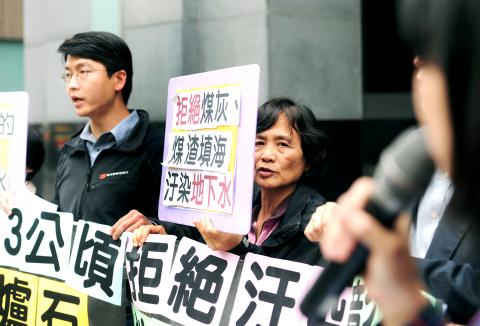Environmental activists from Changhua County gathered in front of the Environmental Protection Administration (EPA) yesterday, urging it to reject the Ministry of Economic Affairs’ (MOEA) industrial land reclamation project near the Changhua Coastal Industrial Park.
The activists, who represented several civic groups, said that the government had already rejected Kuokuang Petrochemical Technology Co’s plans to build a naphtha cracker in the county, to protect the area’s important wetlands, so it should not approve the ministry’s proposal to reclaim land using basic oxygen furnace slag and coal ash.
Chang Shu-fen (張淑芬), representing a women’s health group, said that most of the county’s residents still drink groundwater, but if furnace slag and coal ash are used for land reclamation, no one can guarantee that hazardous substances would not contaminate the water supply, especially since the area’s arenaceous soil is highly permeable.

Photo: Lo Pei-der, Taipei Times
Changhua County Environmental Protection Union secretary-general Shih Yueh-ying (施月英) said “the pH value of basic oxygen furnace slag is between 12 and 13, meaning it is a strong alkali, and if it flows into the ocean it would harm the marine environment.”
There are heavy metals and dioxins in furnace slag and coal ash, which could end up being ingested by people through the food chain if the toxic substances have contaminated the groundwater used in aquaculture, she added.
Taiwan Water Conservation Alliance spokesperson Chen Jiau-hua (陳椒華) said information provided by the ministry about the permeability of the soil in the area is insufficient, but other research reports about the soil along Changhua’s coastline showed that the permeability near the area is not appropriate for land reclamation.
Saying the potential risks of the project are too high, they urged the Environmental Protection Administration to reject the ministry’s proposal.

A Taiwanese software developer has created a generative artificial intelligence (AI) model to help people use AI without exposing sensitive data, project head Huang Chung-hsiao (黃崇校) said yesterday. Huang, a 55-year-old coder leading a US-based team, said that concerns over data privacy and security in popular generative AIs such as ChatGPT and DeepSeek motivated him to develop a personal AI assistant named “Mei.” One of the biggest security flaws with cloud-based algorithms is that users are required to hand over personal information to access the service, giving developers the opportunity to mine user data, he said. For this reason, many government agencies and

The National Fire Agency on Thursday said a series of drills simulating a magnitude 8.5 earthquake would be held in September to enhance the government’s emergency response capabilities. Since earthquakes cannot be predicted, only by continuously promoting disaster prevention measures could Taiwan enhance its resilience to earthquakes, agency Director-General Hsiao Huan-chang (蕭煥章) said in a news release. The exercises would be held to mark annual National Disaster Prevention Day on Sept. 21, the aim of which is to test Taiwan’s preparedness and improve its earthquake resilience in case of a major temblor, Hsiao said. As part of those drills, an earthquake alert would

DEFENSE: The National Security Bureau promised to expand communication and intelligence cooperation with global partners and enhance its strategic analytical skills China has not only increased military exercises and “gray zone” tactics against Taiwan this year, but also continues to recruit military personnel for espionage, the National Security Bureau (NSB) said yesterday in a report to the Legislative Yuan. The bureau submitted the report ahead of NSB Director-General Tsai Ming-yen’s (蔡明彥) appearance before the Foreign and National Defense Committee today. Last year, the Chinese People’s Liberation Army (PLA) conducted “Joint Sword-2024A and B” military exercises targeting Taiwan and carried out 40 combat readiness patrols, the bureau said. In addition, Chinese military aircraft entered Taiwan’s airspace 3,070 times last year, up about

STRICTER ENFORCEMENT: Taipei authorities warned against drunk cycling after a sharp rise in riding under the influence, urging greater public awareness of its illegality Taipei authorities have issued a public warning urging people not to ride bicycles after consuming alcohol, following a sharp rise in riding under the influence (DUI) cases involving bicycles. Five hundred and seven people were charged with DUI last year while riding YouBikes, personal bicycles, or other self-propelled two-wheelers — a fourfold increase from the previous year, data released by the Taipei Police Department’s Traffic Division showed. Of these, 33 cases were considered severe enough to be prosecuted under “offenses against public safety,” the data showed. Under the Road Traffic Management and Penalty Act (道路交通管理處罰條例), bicycles — including YouBikes and other